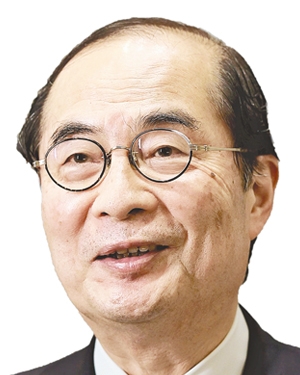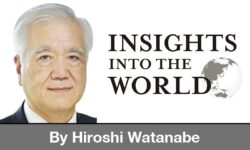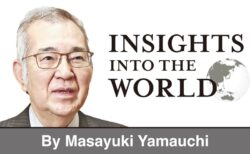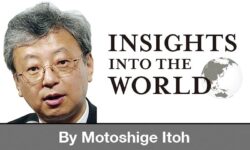11:00 JST, April 11, 2025
“The golden age of America begins right now,” said U.S. President Donald Trump in his inaugural speech on Jan. 20. In less than three months, he has implemented many policies by signing a number of executive orders.
Before he returned to the presidency, there was varied discussion over what the world would look like under a new Trump administration. So far, one thing has been clear: The “U.S. century,” which lasted for 80 years after the end of World War II, is over.
Of course, we will see going forward just how this will impact the world and the United States itself. The policies he has rolled out one after another are quite different from what we expected and are hard to understand.
Making good on his election promise, the president has imposed additional tariffs on goods imported from long-time trading partners Canada and Mexico, in addition to tariffing goods from China, which he has called an adversary, and those from many other countries. His trade policy is centered on the belief that unfair competition by other countries has been a drag on the U.S. economy. However, it is the United States that has led the global economy as seemingly the sole winner, while ignoring Europe, which is still suffering from a recession, China, which continues to struggle with bad loans, and Japan, which is still trying to “escape deflation.” Nonetheless, many Americans hardly feel affluent due to inequality in their country.
The problem with the United States is not insufficient growth across its economy, but rather that the inequality in the distribution of goods and services produced within the country is too severe. Distortions in U.S. society caused by the inequality are extremely serious.
The average life expectancy of the U.S. population is the shortest among the Group of Seven countries. In fact, from 2019, the year before the COVID-19 pandemic started, to 2021, life expectancy in the United States shrank by 2.5 years. But this was merely an average.
In the United States, “health inequality” has worsened in parallel with the growing wealth gap. It is natural that “poor white people,” who could be considered victims of inequality, resent their circumstances.
Tariffs a useless remedy
Trump has imposed tariffs to resolve a multitude of problems, including the ones just mentioned, in the United States. But, in reality, tariffs are a useless remedy. What needs to be done is for the federal government and public sector to strengthen income redistribution through taxation and social security reform. However, such a policy approach is anathema to Trump.
Although “small government” has been a core part of the Republican Party’s ideology, the Trump administration is deviating from the normal course of action.
The newly established Department of Government Efficiency, helmed by businessman Elon Musk, has been engaged in a massive layoff of federal workers. Musk has caused confusion by unilaterally sending emails to all federal employees, requesting that they report what they achieved in the last week and warning on X, “Failure to respond will be taken as a resignation.”
The Trump administration has suspended operations of the U.S. Agency for International Development, which is responsible for providing U.S. foreign aid around the world. The agency was described as a waste of taxpayers’ money.
The administration’s move to shrink the federal government and public sector down to the bare minimum will affect more than the United States.
Up until recently, developed countries were collaborating toward a global tax rule to prevent tax evasion by global firms. However, Trump’s new administration announced U.S. withdrawal from a global tax deal shortly after his inauguration. This was just one of many cases of international cooperation being undermined.
Trump has also announced he is once more pulling the United States out of the Paris Agreement, a framework for tackling climate change. Global warming is a “hoax,” he said. Additionally, he ordered a withdrawal from the World Health Organization.
Despite turning its back on the international community in the ways mentioned, the Trump administration is ardently trying to broker peace between Russia and Ukraine.
However, Trump is favoring Russia, which is the aggressor, over Ukraine. In answering a reporter’s question, he said it was “unlikely” that Ukraine would get back all the land Russia has occupied since 2014. On Feb. 28, a White House meeting between Trump and Ukrainian President Volodymyr Zelenskyy broke down abruptly, though not necessarily unexpectedly.
These developments in Ukraine are not something that Japan can afford to ignore. For instance, if the United States were unilaterally to begin negotiations with Russia over the return to Japan of the Northern Territories — which Moscow has illegally occupied since its invasion in 1945 — and were Washington then to say that it was “unlikely that Japan will get back all of the land,” such a premise would be completely unacceptable for Japan.
In response to the White House clash between the U.S. and Ukrainian presidents, the leaders of European countries immediately expressed their full support for Zelenskyy. The conflict between Europe and the United States, which isn’t hiding its pro-Russia stance, has become decisive. As a result, the U.S.-led global order that was in place for 80 years after World War II has ended.
Bonds based on empathy
There are arguments for and against Trump’s remarks, actions and policies even in the United States. The Trump administration, for its part, will most likely continue to pursue a path that appeals only to its supporters.
How should we deal with this situation? The important thing to remember is that the Trump administration’s policies are short term and that term will end in four years’ time. We must not lose sight of the long term.
Global warming is not a “hoax.” International cooperation will be of great importance should there be another global pandemic. In other words, the WHO is, and will be, indispensable to the world.
U.S. Vice President JD Vance has criticized Europe for suppressing free speech in its efforts to combat disinformation on digital platforms. However, I wonder how many people think it’s appropriate to let disinformation spread unchecked on the internet as it does at present.
The upheaval in the global order will undoubtedly have a major impact on Japan as well. We should not forget that a country’s position in the international community is supported not only by physical forces such as economic and defense strength but also by “soft power” such as culture. The question is how much support Japan can get from the people of the world.
Japan has many resources that offer it soft power. For instance, “mottainai,” the Japanese phrase used to describe a sense of regret about waste, once made many people in Africa empathetic toward the Japanese people. Even now, mottainai can be called an essential concept given how the sustainability of the environment is being tested.
The Japanese word “ikigai” — which literally means “worth living” — is seeing use in Europe. The word is being applied to a wide range of fields, including consulting work, tourism, publishing and psychotherapy.
“Instruments of a Beating Heart,” a short documentary film directed by Ema Ryan Yamazaki that examines Japan’s primary school education, has also proved a major example of this kind of influence. The documentary was nominated for an Oscar at the 97th Academy Awards this year. Featuring the daily routine of an ordinary primary school over a year during the COVID pandemic, the film must have captivated foreign audiences.
The real world is far from ideal. That said, what is important for countries in the long term has little to do with being confrontational or intimidating. Nations need to connect with the people of the world and maintain these relationships through empathy.

Hiroshi Yoshikawa
Yoshikawa is a professor emeritus at the University of Tokyo. He has served as the chair of the Fiscal System Council, an advisory panel to the finance minister. He is the author of “Reconstruction of Macroeconomics: Methods of Statistical Physics, and Keynes’ Principle of Effective Demand.”
The original Japanese article appeared in the April 6 issue of The Yomiuri Shimbun.
Top Articles in Editorial & Columns
-

Riku-Ryu Pair Wins Gold Medal: Their Strong Bond Leads to Major Comeback Victory
-

40 Million Foreign Visitors to Japan: Urgent Measures Should Be Implemented to Tackle Overtourism
-

China Provoked Takaichi into Risky Move of Dissolving House of Representatives, But It’s a Gamble She Just Might Win
-

University of Tokyo Professor Arrested: Serious Lack of Ethical Sense, Failure of Institutional Governance
-

Policy Measures on Foreign Nationals: How Should Stricter Regulations and Coexistence Be Balanced?
JN ACCESS RANKING
-

Japan PM Takaichi’s Cabinet Resigns en Masse
-

Japan Institute to Use Domestic Commercial Optical Lattice Clock to Set Japan Standard Time
-

Israeli Ambassador to Japan Speaks about Japan’s Role in the Reconstruction of Gaza
-

Man Infected with Measles Reportedly Dined at Restaurant in Tokyo Station
-

Videos Plagiarized, Reposted with False Subtitles Claiming ‘Ryukyu Belongs to China’; Anti-China False Information Also Posted in Japan
























